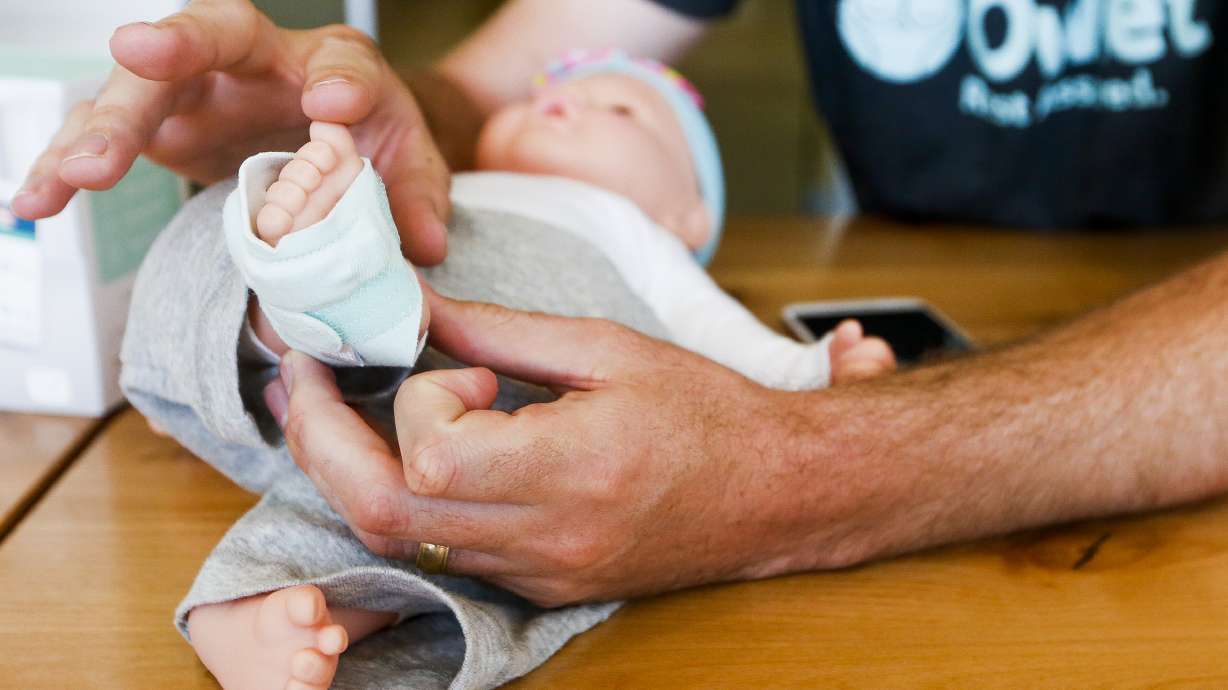Estimated read time: 4-5 minutes
This archived news story is available only for your personal, non-commercial use. Information in the story may be outdated or superseded by additional information. Reading or replaying the story in its archived form does not constitute a republication of the story.
LEHI — Lehi-based company Owlet has stopped selling its popular baby monitoring socks after getting a warning from the Food and Drug Administration, prompting outcry from some parents.
In an October letter, the FDA warned that Owlet needs to apply for marketing clearance as the socks are medical devices "intended for use in the diagnosis of disease or other conditions or in the cure, mitigation, treatment, or prevention of disease, or to affect the structure or any function of the body."
Owlet uses technology and data to create a connected and accessible nursery for babies and gives parents real-time updates and insights on their baby's health. Its products include the third generation Owlet Smart Sock, the Owlet Cam, a smart HD video baby monitor, the Dream Lab sleep guide, and the Owlet Pregnancy Band — a band still in beta testing to monitor unborn babies' vitals.
In the letter, the agency threatened penalties if Owlet did not pull its Smark Sock from the market.
"The FDA will evaluate the information that your firm submits and decide whether the product may be legally marketed," the FDA said.
A Change.org petition set up one week ago to oppose the federal agency's decision has received nearly 60,000 signatures as of Wednesday, with dozens of parents sharing that the Smart Sock has given them peace of mind, and some saying it even saved their child's life.
Katie Mayne, the mother of a premature baby, questioned why the FDA would treat the product differently than a baby monitor.
"It's just like having a baby monitor. The FDA didn't have to approve having a camera on your child so that you make sure they're not getting caught in things," Mayne said.
She said after her daughter was born five weeks early, the baby girl experienced breathing problems. The Smart Sock helped give the mother some comfort knowing they were taking "every single precaution," Mayne said.
"I know it's not intending to be diagnosing anything and I don't think anyone's really expecting it to be that. It's just more having a way to know that everything is OK, just adding reassurance to parents that are already a little bit scared," she added.
The Smart Sock uses pulse oximetry — a noninvasive method of measuring the saturation of hemoglobin in the blood — to monitor the heart rate and blood-oxygen levels and sleep trends of babies as they sleep and alerts parents of any changes through an app notification so they can help their child.
In July, Owlet officials said 28.5% of Utah babies leave the hospital with a Smart Sock, and the company has used the data to create the largest data set of infant health that has ever been collected.
"The letter we received from the agency did not identify any safety concerns about the Smart Sock; rather, the FDA asserts that the Smart Sock should be classified as a medical device in the U.S. because of the heart rate and oxygen notifications. Based on the FDA's recent letter, Owlet plans to pursue marketing authorization from the FDA for these features," the company said in a statement to KSL.com.
Owlet plans to submit a device application to the FDA, and in the meantime sales on the Smart Sock have halted.
"We plan to offer a new sleep monitoring solution, which we believe will be available soon. We also plan to continue to support our current customers. We will notify customers of any updates to the Smart Sock products that have already been distributed. This action is specific to the U.S. only and no other countries or regions are affected by this," the company said.
Owlet officials noted the product has been on the market for six years. More than 1 million babies have been monitored using the socks, according to the company.
"We will continue to stay focused on our mission and are cooperating with the FDA so we can continue to provide sleep monitoring products and solutions to parents and babies," according to the statement.
In July, Owlet went public through a merger with Sanbridge Acquisition Corporation, a publicly traded special purpose acquisition company, in a deal that valued the equity of the combined entity at about $1.4 billion and provided Owlet with $135 million to expand its product line and global reach. The joint company has been renamed "Owlet, Inc." and has begun trading under the OWLT ticker symbol.
Contributing: Debbie Worthen









